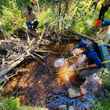The Delaware River Basin Commission (DRBC), a federal interstate government agency responsible for managing the water resources within the 13,539 square-mile Delaware River Basin, announced yesterday that it intends to consider a resolution seeking a permanent ban on fracking anywhere within the Delaware River watershed. If adopted, the resolution would initiate a process that would seek to formalize the de facto ban that has been in place since the DRBC enacted a moratorium on hydraulic fracturing in 2010. But many groups that have been fighting for a permanent ban on fracking warn that the proposed resolution, by failing to ban fracking water withdrawals and the transport and processing of fracking wastewater within the watershed, doesn't go far enough to protect the Delaware's trout, shad, smallmouth and striped bass, or the drinking water it provides for 15 million people.
According to the DRBC, the proposed rulemaking process that would lead to a permanent fracking ban is the result of the commission's close following of the "the evolving scientific literature on the impacts of natural gas development on water resources" which indicates that "the combination of hydraulic fracturing with horizontal drilling and related activities for extracting natural gas from tight shale formations presents risks, vulnerabilities and impacts to surface and ground water resources across the country."
But the proposed process would stop short of banning all fracking related activities and would instead seek to regulate how fracking wastewater can be stored, processed and even disposed of within the Delaware basin, as well as transportation of water out of the basin for fracking operations elsewhere.
While conservation groups are applauding the potential permanent ban of drilling within the basin, they are highlighting the dangers of its limitations, with some even referring to the proposed ban as rollback of existing regulations.
The NRDC's Rob Friedman and Kimberly Ong note that by allowing processing and disposal of wastewater as well as water withdrawal, the proposed rulemaking "would be a step backwards from the existing moratorium, which protects against all of these activities."
In a statement, Maya van Rossum, who leads the Delaware Riverkeepers Network, echoed concerns that the proposed rule would represent a step backwards. "With this resolution, the DRBC is poised to roll back the high level of protection from drilling and fracking for shale our watershed now enjoys. While posturing the possibility of a ban on fracking in some parts of our watershed, the resolution opens the door wide to many of the most devastating impacts that drilling and fracking for shale brings to waterways and communities. As a result, we must oppose it", van Rossum said.
The DRBC will hold a public meeting to consider the resolution on September 13, 2017. If adopted, the commission will initiate a public comment period on the draft rulemaking process no later than November 30, 2017.































Comments